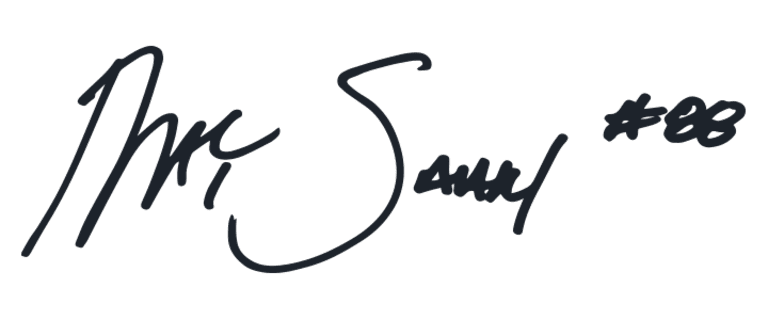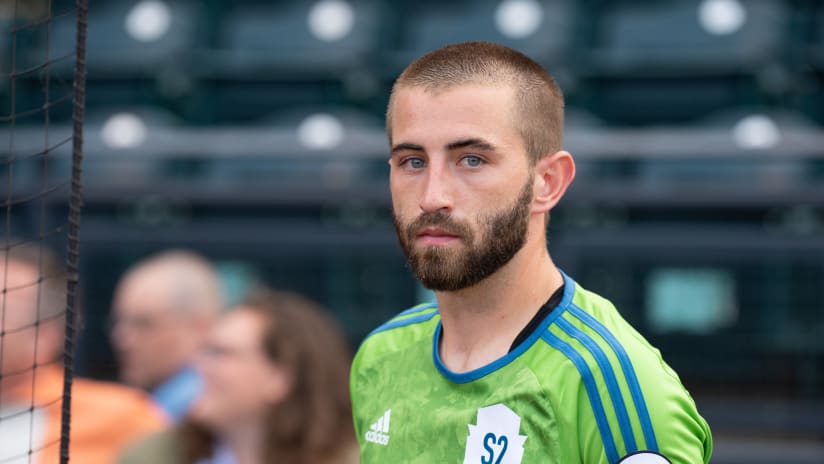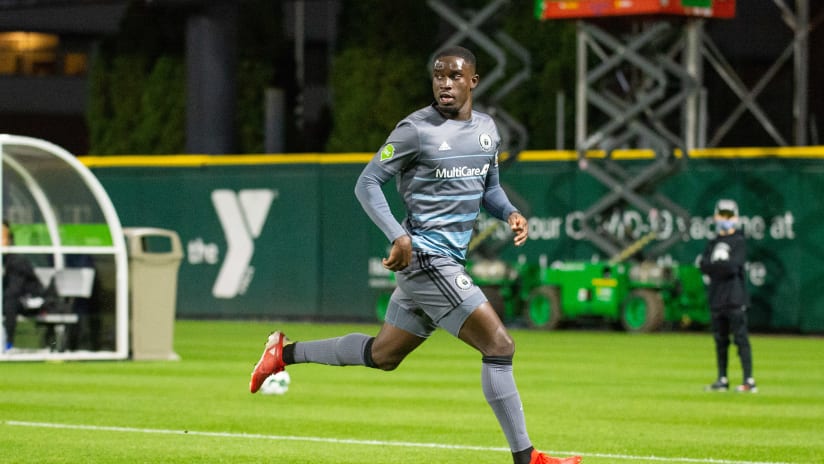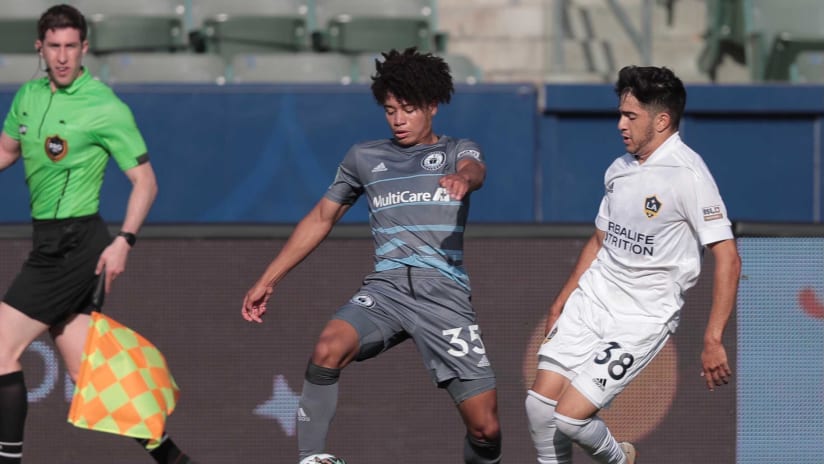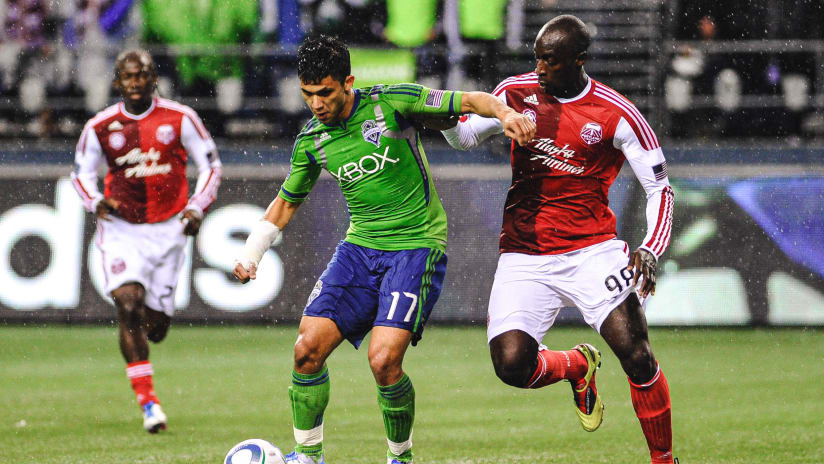This is a feature in Issue 16 of Sounders Monthly. Copies are available for free at The NINETY, GuestLink Services locations, Soccer Celebration and Membership Central. You can also access it on the Sounders Mobile App.
As a kid, I would lay awake in bed for countless hours of the night thinking about how badly I wanted to be a pro. My mind would race with questions and ideas about how I could get better so I could one day make it to MLS.
At school, I counted down the hours until I got to play footy. When I played, my mind was totally consumed with the game. I lived for the sport. Nothing else mattered.
All that changed in November 2010.
It was the day of the Oak Park High School men’s soccer banquet in Kansas City, which marked the end of my successful sophomore campaign and the beginning of my next club season.
The afternoon leading up to the banquet was supposed to be the only time I had to go to the doctor for the foreseeable future. I had him check out a cough that had been bothering me for a few months. I figured I would get some antibiotics and be as good as new in a couple of days. That wasn’t the case.
After telling the doctor about my cough, he started asking questions about fatigue and shortness of breath. My mom explained that I had seemed a little lethargic, but my whole focus was on tomorrow’s practice. The doctor thought it could be a mild case of pneumonia, so we agreed to get a chest X-ray done.
The doctor pointed out six grey masses on the scans. They were tumors. He believed they were cancerous.
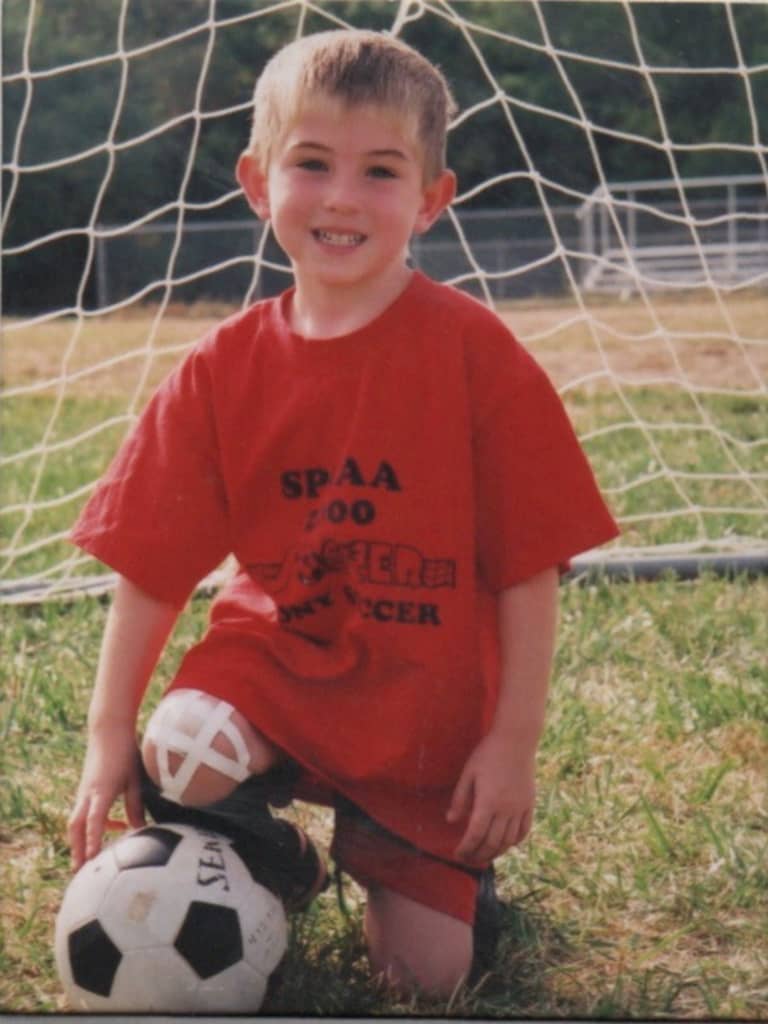
We glanced at him with uncertainty. What people say is true: Nothing can ever prepare you to hear that word.
He hadn’t said it yet, but I felt it coming. I needed to be taken to a bigger hospital, which would receive my file. My mom and I left in silence, but I insisted on going to the banquet that evening.
It was a typical soccer banquet. Everyone was having a good time and talking about the season. But as I sat there, I wasn’t thinking about soccer for the first time in forever. Occasionally, I’d peek over at my mom and she’d give me a worrying look. During the event, we received a call that a room had opened and we made our way to Children’s Mercy Hospital.
While we waited for the doctor, I pulled out my geometry homework that was due the next day and put a soccer game on the TV. My mom nervously rocked in a chair.
Dr. Elliot walked in and told me they had scheduled surgery for the day after Thanksgiving.
Why do I need surgery? We don’t even know exactly what it is yet, do we?
Dr. Elliot looked at me hesitantly. “You have Stage 3B testicular cancer.”
As I sat on the edge of my hospital bed, she explained the details of my upcoming procedure and the chemotherapy that would kill the six tumors that had metastasized up to my lungs.
When I heard 3B, I wasn’t overly concerned. There had to be at least 10 stages, right? Reality set in when I learned that Stage 4C is the most severe.
Can I still become a pro? Can I keep going to practices? Please don’t take soccer away from me.
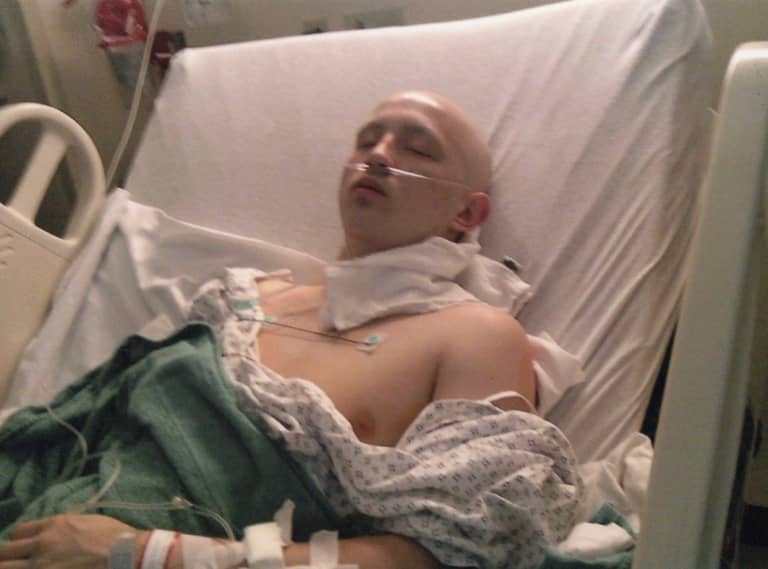
Saari in the hospital during one of his treatments | Courtesy of Ray Saari
The next two weeks were a blur. I had a port put in, an orchiectomy and started chemotherapy. My life had hit a serious speed bump. As a 15-year-old kid, the things that had seemed most important — school, friends, girls — hit the sidelines. Cancer was a reality now, but it didn’t consume me. I was still thinking about soccer and when I was going to be able to play again.
Between those chemo sessions, I wasn’t allowed to play soccer, go to the gym or engage in any other contact sports, and often found myself on a stationary bike. I started to read Lance Armstrong’s book, It’s Not About the Bike: My Journey Back to Life. I never imagined I would share a similarity with a seven-time Tour de France winner, but each of his cycling titles came after he had testicular cancer.
You better believe I still thought I could become a pro. In addition to the bike, I found ways to play footy while I was in between treatments. When my parents found out about it, my mom’s response wasn’t what I expected: How do you stop a determined child when you know that same determination is keeping him alive?
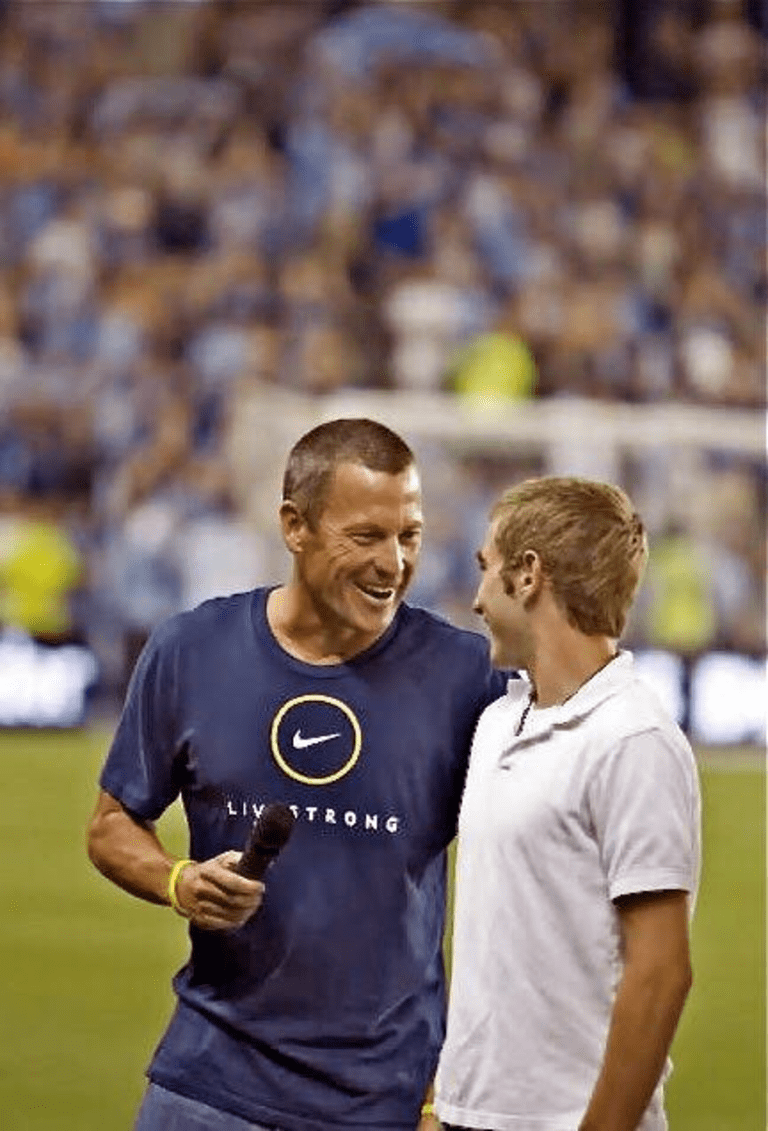
Until that point, I had never thought about dying. To this day, I still don’t know what my doctor thought my odds of survival were. I’ve made the decision to carry that determination with me for the rest of my life.
I finished my treatments in March 2011, but there were still tumors in my lungs. I underwent surgery to remove the tumors, but I was concerned that cutting out pieces of my lungs would put me at a disadvantage on the field.
Thankfully, the surgery was a success. The tumors were benign.
In September 2011, six months after my last round of chemo ended, I was officially deemed in remission — the greatest words anyone who’s been affected by cancer could ever hear.
More importantly, I was officially free to play footy again.
My highlight came a couple of months earlier in June, when I went to the first match at Sporting Kansas City’s new stadium, then-Livestrong Sporting Park. My parents told me to wear slacks and a polo, and I was like, “What are you talking about? To a soccer match?” Next thing I knew, we were escorted to the owner’s suite, then, to my complete surprise, the locker room.
I opened the door. Lance Armstrong was sitting right in front of me.
“Hi, I’m Lance.”
Through the shock, after a few seconds, I finally blurted out, “Hi, I’m Ray!”
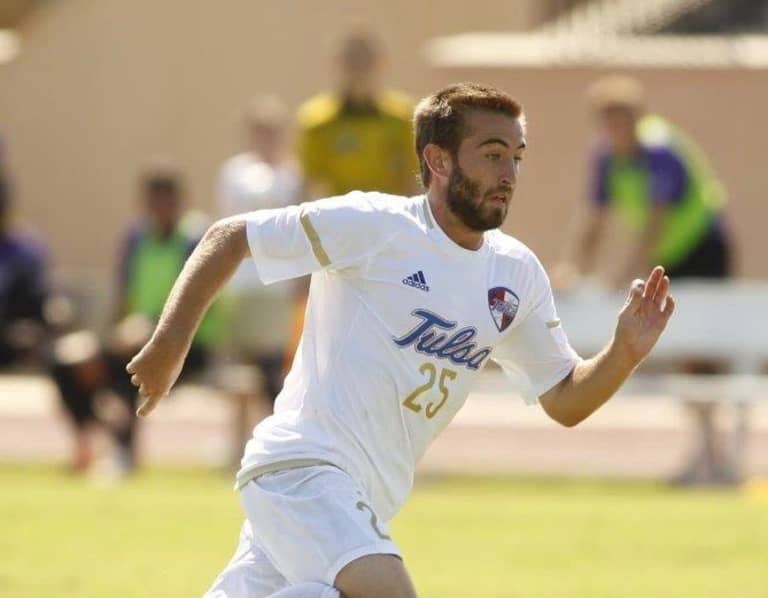
Saari playing at the University of Tulsa | Courtesy of Ray Saari
A few minutes later, I walked out on the pitch with one of my heroes. I pointed toward my club teammates and waved, and Lance leaned over and asked if that’s my fan section. The whole thing was surreal. I had a photo with him in the paper the next morning.
Slacks were a good call.
For a couple of seasons, a childhood cancer survivor was honored before each Sporting KC home match. I was the very first one.
Just like me, Lance battled cancer before reaching the highest heights as a cyclist. I was ready to do the same as a soccer player. I was the guest of honor for the match, and I got to sit in the same suite as one of the greatest athletes on the planet. An idol of mine, an inspiration for me to defeat cancer, and soccer — all in one. I didn’t even know it was possible. I couldn’t have dreamed it.
After this life-changing experience, I knew anything was possible. I finished my high school and club careers over the next few years and committed to the University of Tulsa, where I continued my dream of becoming a pro.
During my four years at Tulsa, I was fortunate to be on a team that shared the same determination that I acquired through my battle with cancer. We won three AAC championships and I ended my career with 12 goals and 12 assists as a holding midfielder. I thought I had proven myself worthy of making it to the Major League Soccer combine, but that wasn’t the case.
On draft day, no one called my name. I was left questioning again if I was ever going to become a pro.
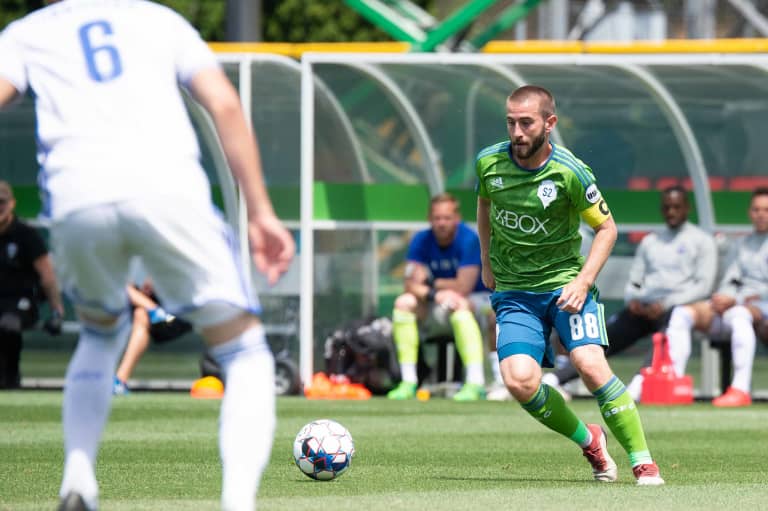
Saari captaining S2 during a match against Reno 1868 FC | Charis Wilson
Once the draft concluded, the Seattle Sounders invited me to preseason. A week into camp, S2, the Sounders’ USL affiliate, offered me a contract.
It had finally happened. I was a pro.
I was given an opportunity to be part of a club that did more work within its community than I could have ever imagined. I have always dreamed of inspiring kids going through the same things I did in 2010, but I never thought a professional organization would encourage me to do as much as the Sounders have.
Before each MLS match, the Sounders honor a child who has battled cancer, and I look back at my memories with Lance from 2010 when I was a 15-year-old kid with a dream of becoming a pro. Not only did our organization give me a chance to reach my goal, but the Sounders share the same passion for giving kids who are fighting cancer an inspiration to achieve their dreams.
